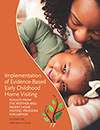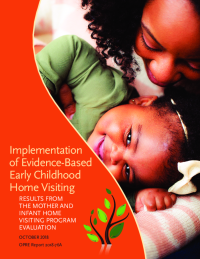Implementation of Evidence-Based Early Childhood Home Visiting
Results from the Mother and Infant Home Visiting Program Evaluation

 The skills and abilities that children develop in their earliest years help lay the foundation for their future success. Similarly, early negative experiences can contribute to poor social, emotional, cognitive, behavioral, and health outcomes in early childhood and in later life. Children growing up in poverty tend to be at greater risk of encountering adverse experiences that negatively affect their development. One service strategy that has improved these outcomes is early childhood home visiting, which provides information, resources, and support to expectant parents and families with young children, typically infants and toddlers, in their home.
The skills and abilities that children develop in their earliest years help lay the foundation for their future success. Similarly, early negative experiences can contribute to poor social, emotional, cognitive, behavioral, and health outcomes in early childhood and in later life. Children growing up in poverty tend to be at greater risk of encountering adverse experiences that negatively affect their development. One service strategy that has improved these outcomes is early childhood home visiting, which provides information, resources, and support to expectant parents and families with young children, typically infants and toddlers, in their home.
A substantial literature has provided evidence of home visiting impacts on family functioning, parenting, and child outcomes. However, many gaps in knowledge about home visiting programs exist, including information about program implementation. Evaluations of home visiting have rarely collected detailed information on the services provided to families, so it is difficult to know whether impacts on particular outcomes are associated with implementation or with features of the home visiting model.
This report describes the local programs, home visiting staff, and families who participated in the Mother and Infant Home Visiting Program Evaluation (MIHOPE), a national evaluation of the federal Maternal, Infant, and Early Childhood Home Visiting (MIECHV) program launched in 2011. MIHOPE is systematically examining how program features and implementation systems of 88 local MIECHV-funded programs are associated with services delivered and impacts across four evidence-based home visiting models: Early Head Start – Home-based option, Healthy Families America, Nurse-Family Partnership, and Parents as Teachers.
Families who were interested in and eligible for the programs being evaluated, and who consented to be in the study, were randomly assigned to either the MIECHV-funded local program or to a control group that was referred to other appropriate services in the community. From October 2012 to October 2015, 4,229 families entered the study; 11 families ultimately withdrew, for a final analytical sample of 4,218 families (2,104 in the program group; 2,114 in the control group). For the implementation research analysis — the subject of this report — the samples of interest are the 2,104 families randomly assigned to the MIHOPE program group and the staff at all 88 local programs. Implementation research data were collected from September 2012 to June 2016.
Key Findings
-
The MIECHV-funded local programs served families in disadvantaged communities with high levels of risk. Mothers participating in MIHOPE tended to be young and economically disadvantaged and exhibited a variety of risks that could affect their children’s development.
-
Similar to prior research, families in MIHOPE participated in home visiting for eight months on average — less than expected by the four evidence-based models in the study. More disadvantaged families tended to participate for less time than other families.
-
Local programs focused on improving parenting and child development outcomes, which all four of the evidence-based models have emphasized. A majority of visits included discussion of these topics.
-
Home visitors attended more training and most felt well supported and effective in improving parenting and child development, compared with other areas.
-
Services related to sensitive topics were tailored to family needs. Home visitors addressed topics such as substance use, mental health, or intimate partner violence more often with families who were more likely to need help in these areas compared with other families. Home visitors who attended training on these topics addressed them more often with families.
Further analyses will build on the current analysis to learn about the ways in which implementation features are associated with program impacts. Together, these findings will inform current and future efforts to strengthen home visiting services and their benefits for families.






